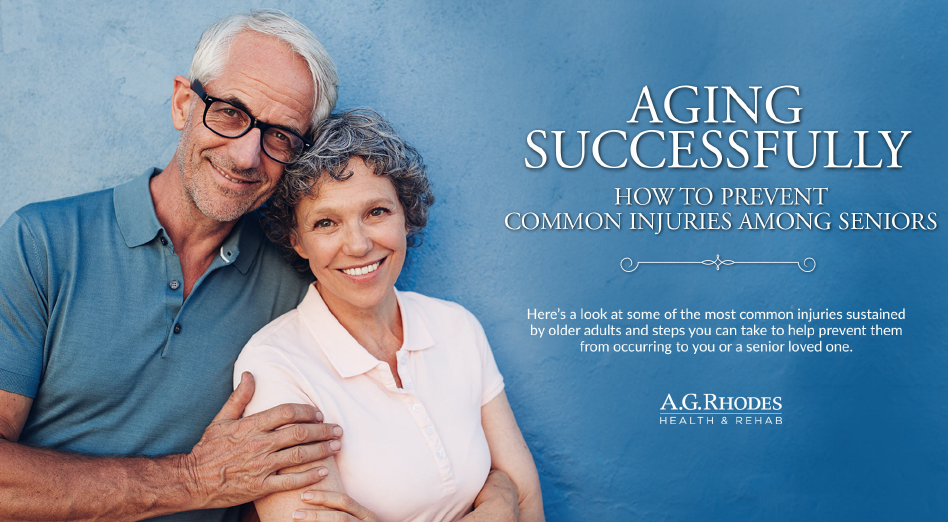Hip Fractures
Hip fractures caused by falls are one of the most common injuries suffered by seniors, as well as being the number one injury responsible for senior hospitalizations. Fortunately, there are a number of things you can do to fall-proof your or your loved one’s home:
- Remove area rugs to reduce chance of tripping on a raised edge
- Improve lighting throughout the entire home so there are no long stretches of darkness
- Install mobility support features (such as hand rails) anywhere they’re needed
- Ensure all flooring is clean, intact and devoid of any debris or objects that could cause a fall
For more detailed statistics regarding senior falls and ways to prevent them, visit the National Council on Aging’s (NCOA) website at www.ncoa.org.
Burns
Burns are another common injury among older adults, especially those who smoke and/or are still independent enough to cook for themselves.
If you or your elder family member smokes, set up safe, supervised smoking areas that feature the appropriate disposal containers to reduce the risk of smoking-induced burns and fires. Deep ash trays are best, and filling them with water will help ensure discarded butts don’t smolder into a fire. Smoking in bed is also a serious risk, so discourage smoking when going to sleep, after drinking alcohol or taking medications that may similarly affect cognition and awareness.
As far as cooking burns are concerned, there are many safety best practices that may help reduce the risk for fire or injury:
- Cook on back burners when possible to keep pots away from the edge
- Make sure handles of pots and skillets are pointed away from the front
- If using the microwave, use containers that allow steam to escape to avoid scalding
- Have oven mitts or pot holders close at hand and make their use a ritual in the kitchen
- Lower your water heater temperature to 120 degrees Fahrenheit to further reduce burning risk
A more preferable option may be to transition into a reputable local nursing home such as A.G. Rhodes, where residents can continue pursuing their interests, such as cooking, in a safe, assisted environment.
Sprains and Strains
As we grow older the tissues within our joints wear down, making them less flexible and more prone to being pulled, strained or sprained – especially the wrists and ankles.
Overextended ligaments, in extreme cases even torn ligaments, are commonly referred to as sprains, and most occur in ankles, knees and wrists. Walking on even surfaces, avoiding athletic activity that may require excessive pivoting and adding fall deterrents around the home can help reduce your loved one’s risk of spraining a ligament.
Strains are similar to sprains but affect muscles instead of ligaments. Some common causes of strained, pulled or even torn muscles in older adults include lifting heavy objects, especially from an awkward position, athletic activities such as running, jumping or throwing or slipping on ice.
You can help reduce the risk of spraining or straining something by installing rails and grab bars around toilets, in slippery showers and near the bed to make it easier to get up and down (or in and out) of these areas. While exercise is very important for seniors, it’s also essential to ensure physical activities are designed to avoid sprains and strains. Even-surfaced walking paths, water aerobics and other low-impact exercises can help reduce the risk for overexerting or damaging muscles or ligaments.
Head Trauma
Head trauma is a concern for every age group, but especially for those more prone to falls and accidents due to declining or limited mobility. In addition to weakening bones, joints and tissues, growing older also slows our reflexes and reduces muscle strength. This in turn makes falling especially dangerous for seniors, as they may have difficulty catching their fall or slowing down their momentum to reduce the force of impact.
Make certain that all flooring surfaces are free of damage and clutter, especially areas near furniture with sharp edges and stairways. The use of a walker, railing or other sturdy furniture of appropriate height for grabbing and supporting one’s self can help reduce the chance for falls in the home.
Short-Term Recovery Care in GA
If you or a senior loved one have recently been injured, ill or undergone surgery and could use some short-term care and assistance to get you back on your feet until you fully heal and recover, A.G. Rhodes is here to help. We offer a short-term recovery care program, as well as inpatient and outpatient therapy and rehab services, to ensure seniors throughout the Atlanta area have the attentive, compassionate, round-the-clock care they need to safely recover and regain their strength.
Visit our website to learn more about our short-term recovery services and contact us online with any questions you may have.


